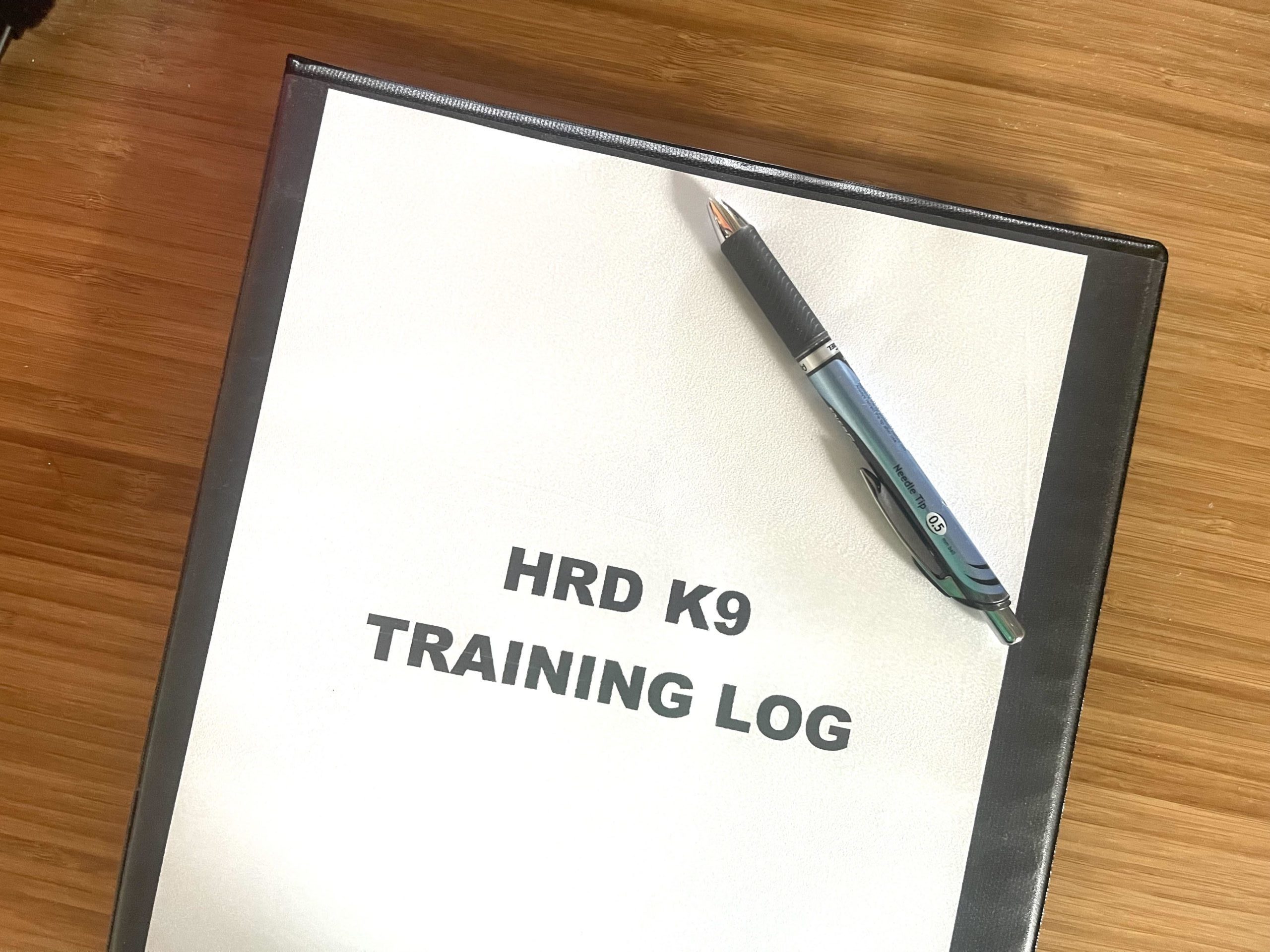Why Keep K9 Training Logs?

If you have been involved with search and rescue for any length of time you are familiar with training logs. A search of any working dog social media group will produce results regarding training log discussions. You may keep training logs simply because someone such as a supervisor, team leader or well-known trainer has told you that you have to or you will be destroyed in court.
But have you put much thought into WHY training logs are so important?
Build Your Credibility
It’s true, training logs are often requested if you are ever called to court on a case you were involved in. Training logs alone will not prove your credibility if you do have to testify. However, training logs are a critical part of building your credibility along with search reports, certifications, assessments, and classes/workshops you have attended. All of these components provide evidence that you and your dog are a credible and competent K9 team.
Let’s take human remains detection as an example. Maybe you are like me and utilize your HRD K9s in a variety of situations, from disasters, to crime scenes, to drownings where we are searching for everything from a recently deceased individual, trace evidence, or dry bone. A search in any of these environments could end up as a court case.
Your training logs will show whether or not you have put adequate time into training across these different environments and scent sources. If you have not documented training in these specific environments or on the entire spectrum of human remains scent sources, a K9 savvy lawyer or expert witness can use that as an opportunity to question your credibility.
For example, you are called to testify about an arson case you worked with your HRD K9 but your training logs show that you have not worked your K9 in collapsed structures nor have you introduced burned remains to your K9. This lack of training, as evidenced by lack of documentation in your training logs, provides the opportunity to introduce doubt into your abilities and credibility.
Obviously, you cannot anticipate the details of every type of search you will work. However, your training should prepare you for the types of searches you and your organization respond to and your training logs should reflect the details of how your training has prepared you to competently respond to these searches.
Create Your Training Plan
Building credibility in the event that you end up in court is not the only reason training logs are important. If you are like most of us, your schedule is packed; training, searches, demos, workshops, not to mention all of the day to day commitments that keep us on the go! Training logs help guide and track your training progress to keep you moving along most efficiently and ensure you maintain a solid foundation in all critical areas.
I often can’t remember what I had for lunch three days ago and I certainly can’t recall the details. Without training logs you run into the same problem. Did I do any vehicle searches this month? Did we use dry bone sources or just fresh sources? What percentage of misses were there? How did I resolve the slow trained final response issue my K9 was having? These are just a small example of the information that is difficult to remember if you don’t document your training.
Training logs keep us on track and provide a way for us to look back and make sure we are hitting our training goals, putting time into components that are important for each stage of our K9’s training, documenting issues and details on how we resolve those issues. Training logs not only provide a detailed record of what you have done, they drive your future training. Use your training logs to identify gaps, spot trends, and guide your plans to fix problems and move your training forward. You shouldn’t complete a log, file it, and never look at it again.
Your logs are full of insights that can help you meet your goals!
Track Your Training Progress
So with so many options, what is the best training log? You have digital forms, aps, training log software, paper forms and the list continues to grow. They can all be great options, but the BEST training log is one that you will use consistently. Personally, I like to use a combination of written or voice recorded notes in the field that are then transcribe into paper training logs, and finally take the critical data such as number of searches, percentage of misses, percentage of finds, percentage of false alerts etc. and enter it into a spreadsheet to track data trends.
Whichever format you utilize for your training logs remember, the log is a living document. The form itself should be reviewed on a regular basis to see if anything needs to be changed or updated based on current industry best practices, changes in agency policy, or if there is something that can be changed to make record keeping easier for you.
What Should Go In Your Training Log?
Regardless of what format of training log you are using, there are certain components EVERY training log should contain, regardless of who you work for and what discipline you are working.
To help you make sure your training logs are meeting industry best practices, we have created this FREE Checklist of the 5 Essential Pieces Of Information That Should Be In Every K9 Handler's Training Log.
⬇️⬇️ Get your copy of this valuable checklist below! ⬇️⬇️
 Deana Hudgins, CFTE Owner, has been working in Search and Rescue since 2001. She is a K9 Senior Training Analyst for Pasco Sheriff's Office. She is also a Canine Search Specialist for FEMA working both human remains detection and live find canines. She has traveled the country as an instructor, evaluator, and facilitator for search and rescue classes and workshops. Deana specializes in human remains detection; water, land and disaster, as well as wilderness and disaster live find. She has responded to hundreds of missing person searches for local, state and federal agencies. She frequently consults as a subject matter expert for large scale training exercises and cases, providing guidance in search strategy and planning, resource management, mapping and data collection. During her years as an instructor, Deana repeatedly saw that there was a lack of resources and training opportunities to fully prepare agencies to respond to search and recovery missions. She established the Center for Forensic Training and Education to ensure that any organization involved with the search and recovery of missing persons has access to real world, hands on, custom training opportunities.
Deana Hudgins, CFTE Owner, has been working in Search and Rescue since 2001. She is a K9 Senior Training Analyst for Pasco Sheriff's Office. She is also a Canine Search Specialist for FEMA working both human remains detection and live find canines. She has traveled the country as an instructor, evaluator, and facilitator for search and rescue classes and workshops. Deana specializes in human remains detection; water, land and disaster, as well as wilderness and disaster live find. She has responded to hundreds of missing person searches for local, state and federal agencies. She frequently consults as a subject matter expert for large scale training exercises and cases, providing guidance in search strategy and planning, resource management, mapping and data collection. During her years as an instructor, Deana repeatedly saw that there was a lack of resources and training opportunities to fully prepare agencies to respond to search and recovery missions. She established the Center for Forensic Training and Education to ensure that any organization involved with the search and recovery of missing persons has access to real world, hands on, custom training opportunities.

